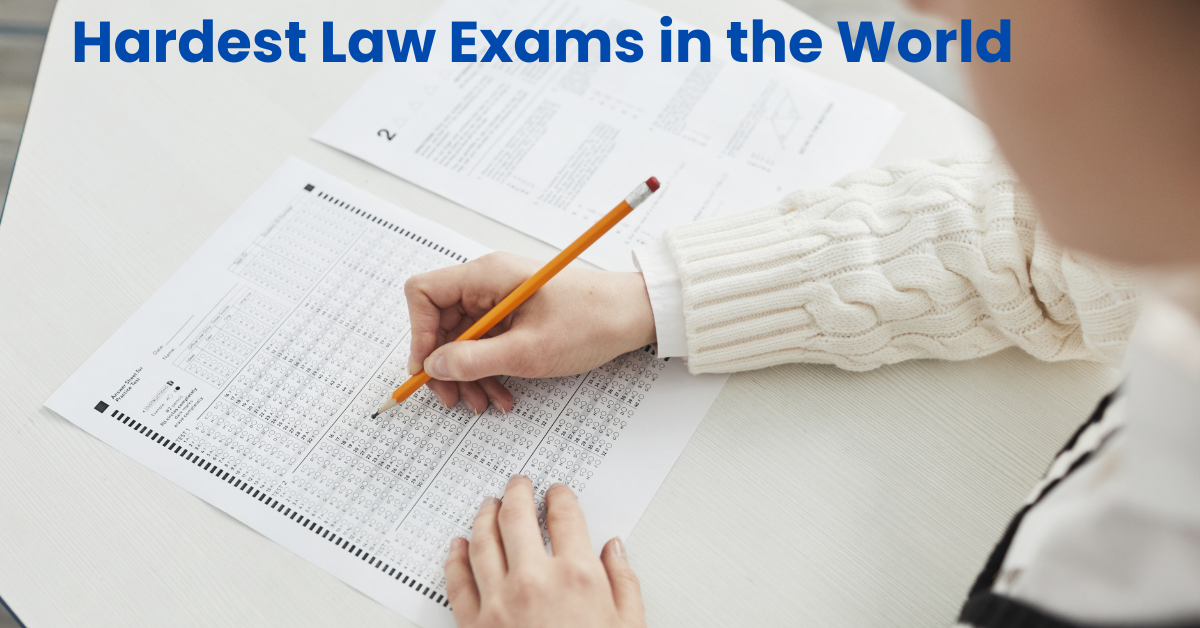Are you considering pursuing a career in law? Lots of lawyers face various challenging exams as they progress in their academic and professional journeys. In this article, we will delve into the top 10+ hardest law exams in the world, providing valuable insights into the rigor and complexity of these assessments. Understanding the difficulty of these exams can better prepare law students for the demanding road ahead.
A legal career involves overcoming challenging exams that test both legal knowledge and analytical and practical skills. This comprehensive guide provides a list of the top 10 hardest exams in the world.

-
California Bar Exam:
-
- Duration: The California Bar Exam spans two days, testing various legal areas.
- Preparation: It demands months of intense study, typically involving bar review courses.
- Pass Rate: historically lower, varying each year.
- Candidates: law graduates with a J.D. degree from a California-accredited law school.
- Website: California Bar Exam
-
New York Bar Exam:
- Duration: A two-day Multistate Bar Exam (MBE) and a one-day New York-specific exam.
- Preparation: This requires extensive preparation, often involving months of study.
- Pass Rate: Varies, with overall rates usually higher than California.
- Candidates: law graduates with a J.D. degree from an ABA-approved law school.
- Website: New York State Board of Law Examiners
-
United States Bar Exam (Multistate Bar Exam, MBE):
- Duration: A full-day examination focusing on multiple-choice questions.
- Preparation: intensive study over several months.
- Pass Rate: Varies by jurisdiction; candidates must pass both the MBE and state-specific components.
- Candidates: law graduates with a J.D. degree from an accredited law school.
- Website: Varies by state; National Conference of Bar Examiners
-
United Kingdom Bar Professional Training Course (BPTC):
- Duration: A one-year postgraduate course with ongoing assessments.
- Preparation: One year of focused study and practical training.
- Pass Rate: Published by BPTC providers.
- Candidates: graduates with an LLB law degree or GDL qualification.
- Website: Bar Standards Board
-
Indian Judicial Services Exam (Various States):
- Duration: Conducted in multiple stages, including prelims, mains, and interviews.
- Preparation: intensive study over months.
- Pass Rate: highly competitive, varying by state.
- Candidates: law graduates aiming for judicial service positions.
- Website: Varies by state; for example, Union Public Service Commission (UPSC)
-
French Judicial Exam (Concours de l’École Nationale de la Magistrature):
- Duration: Conducted in multiple stages over several years.
- Preparation: extensive preparation and practical training.
- Pass Rate: highly competitive, limited successful candidates.
- Candidates: French nationals with a master’s degree in law.
- Website: École Nationale de la Magistrature (ENM)
-
Singapore Bar Exam (Part B):
- Duration: Part B of the Singapore Bar Exam.
- Preparation: Requires completion of the Part A preparatory course and additional study.
- Pass Rate: Rigorous testing of legal skills.
- Candidates: aspiring lawyers seeking admission to the Singapore Bar.
- Website: Singapore Institute of Legal Education
-
South Korean Bar Exam (Korean Legal Examination):
- Duration: Conducted in multiple stages, including a written test and an interview.
- Preparation: extensive preparation, including completion of a law degree.
- Pass Rate: historically low, highly challenging.
- Candidates: law graduates aspiring to become lawyers in South Korea.
- Website: Korea Legislation Research Institute (KLRI)
-
Brazilian Bar Exam (Exame da Ordem dos Advogados do Brasil):
- Duration: Two phases, including a multiple-choice test and a practical test.
- Preparation: intensive study for a post-law degree.
- Pass Rate: Varies by edition; both phases require successful completion.
- Candidates: law graduates seeking accreditation as practicing lawyers in Brazil.
- Website: Exame da Ordem dos Advogados do Brasil
-
International Mathematical Olympiad (IMO):
- Duration: 2 consecutive days, 4.5 hours each day.
- Preparation: months or years of rigorous training programs and problem-solving practice.
- Pass Rate: A small percentage receive gold, silver, or bronze medals.
- Candidates: Teams from around 100 countries, approximately 600 participants.
- Website: International Mathematical Olympiad
Factors that contribute to the difficulty of a law exam
Challenges in Law Courses
Complexity of Legal Concepts:
• Exams may require an understanding of complex legal theories.
Volume of Material:
• Exams covering broad topics or comprehensive understanding of numerous cases can be overwhelming.
Ambiguity in Legal Issues:
• Exams may present ambiguous fact patterns or legal scenarios without straightforward solutions.
Application of Legal Reasoning:
• Exams require analysis, synthesizing, and applying legal principles to specific situations.
Time Constraints:
• Exams often have time constraints, increasing the difficulty of the exam.
Writing Skills:
• Exams requiring well-structured, coherent, and persuasive writing can be challenging for students struggling with clear and concise legal analysis.
Multiple Areas of Law:
• Exams may cover multiple areas of law, posing difficulties for those struggling to connect legal principles across different domains.
Unfamiliar legal frameworks:
• Exams involving new or unfamiliar legal systems, theories, or frameworks may pose challenges.
Application of Statutory Law:
• Interpreting statutes and applying them to specific situations can be challenging due to the complexity of statutory language and legislative intent.



